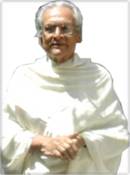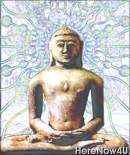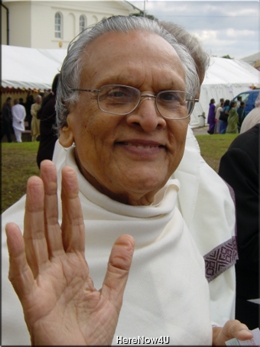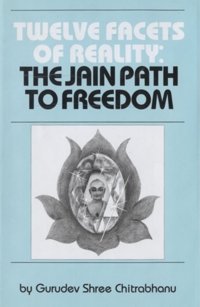
The mind is a ladder. If we are aware, it can help us move upward. If we are not aware, it can cause us to fall. This ladder has both potentialities - to be a help or to be a hazard. In its aware state, our mind is a beautiful instrument. It can receive and transmit truth. It can inspire and uplift us. But in its unrefined, unaware state it works against us. It can trick us into thinking that what we want is right, when it may not be. We use it to rationalize that what we are doing is not wrong, when in fact it is.
When a person depends upon his intellect alone, he doesn't know whether he is rising or falling. He cannot tell because he does not rise above its particular bias. By allowing the intellect alone to judge, he manages to justify even an injustice. He will perceive as an ascent what is in reality a descent.
For example, a young man received his salary at the end of the week and started home with three hundred dollars in his pocket. By mistake he dropped his wallet. It landed on the sidewalk, but he did not notice. It happened that someone walking behind him saw the wallet fall. He picked it up, opened it, and saw the money. He was a good man and his first thought was to give it back. He pictured himself running up to the man, shaking him, and saying, "You silly young boy! Don't you know how to protect your money? Here it is!"
Then a new set of thoughts entered his mind. "For many days I have been out of a job," he thought, "and I have heard that 'God helps those who help themselves!' He helps us in many unseen ways. This must be one of the ways; otherwise, why should I have happened to be here when that man dropped his money? I did not have any theft in mind. I have not actually stolen anything. God has thrown a wallet before my eyes. It is a divine gift. How can I ignore it? It would be an insult to God! There is a reason behind everything, and this is a sign for me." In this way, he rationalized keeping the money and went home happily.
Waiting for him at home was his beautiful and serene wife. When he walked in the door, a whiskey bottle in hand, he announced to her, "Tonight we are going to celebrate!
"How is that possible?" she asked. "We have no money."
"When you trust in God, He helps you," he explained. "The human mind cannot conceive of what God had in store for us today; He gave me three hundred dollars."
Again, she asked, "How did you get it?"
"A young man was going along and dropped his wallet," he told her. "So I picked it up. I did not do anything. It just fell into my path, a divine gift."
She spoke to him gently. "Don't you think that when he goes home smiling, full of hope and happiness because he has just received his week's pay, that someone like me is waiting for him just as I wait for you? Can you imagine his sorrow when he says, 'See, I have brought my pay!' and then finds out that his pockets are empty? Can you imagine his depression? What will he feel when he sees that a whole week's labor is lost? We can enjoy a dinner and a night of celebration, but what about the person who goes with hope and ends with hopelessness? Can you not think of that?"
The intellect is a sword with two edges. It can cut from either side. It can be used by a person for growth or it can be used to justify questionable things by saying that there IS some divine hand behind it all. That is the kind of reasoning, which has led people to justify even animal sacrifice as offerings to God. In the name of God, animals are killed. God does not eat their flesh, but the priests do while murmuring, "Thanks." Thanks to whom? To the intellect, which distorts, manipulates, and justifies even killing in the name of an unknown and unseen God.
Anything can be justified in that manner. Promiscuity is justified by calling it Tantra art. When you speak against it, you appear out of date, and people say you don't know what you are talking about. Others burn out their brain cells with drugs, yet justify it by saying, "I am in heaven, I see so many different colours." If you explain that it is merely hallucination, they laugh at you. If you tell them that what they see has no meaning, they say, "How do you know? You have not taken drugs." These are some of the ways the intellect can act as a ladder to take you downhill.
That is why the masters tell the initiates to purify their mind. It is raw; it is crude like oil. It needs to be refined. If you put crude oil in an airplane, what will happen? It will not take you up. Before it can be used, it has to go through the process of becoming gasoline. Once it has been refined, It can be used in a plane. You can depend on It. You are in the sky and you put your life in its hands. So refined gasoline is the right fuel with which to fly a plane.
In the same way, this mind, this intellect. in its crude form can be dangerous. What we are learning here is how to refine it. It takes time. We don't want to discard it, abolish it, or blow it off. It is very precious. Imagine what power our mind has - it takes hundreds of people into the sky in a single jumbo jet. What is that which lifts the plane? Not the plane itself, but a human mind. If the human mind were not responsible for this feat, then the plane would not budge from the ground. Try throwing a stone into the air; it comes down. Even a feather does not stay in the sky. Here hundreds of thousands of tons are lifted into the sky for fourteen hours at a time! And we all trust it. The trust is based on what? Not on the inanimate plane, but on the human mind which created such a marvellous machine, and on another one that flies it.
Your life is more precious than any airplane. You cannot afford to waste it by stagnating, by keeping this intellect in a crude form. Engage yourself in refining it, and it will help you harness your energy, create beauty and harmony in your life, and move in the direction of evolution. How to refine the intellect? You take on a process of training, of awareness, of meditation. As you go on purifying, gross elements accumulated in the mind are dropped and it becomes clearer and clearer. That in you, which is pure, subtle, and beautiful, emerges. When you become subtle, even your thoughts become transparent, no longer heavy and crude. Thoughts no longer drive you in various directions. They begin to take you in the right direction.
For the initiates, this right direction, this refinement, this insight is called bodhi. Bodhi means to know, to be aware. It is the knowledge, which comes from an inner opening, from inner experience. Bodhi has many more meanings. From this word is derived Buddha, meaning one who knows.
The eleventh bhavana is called bodhidurlabha, which means the rarity and difficulty of achieving such a deep knowledge. The path to Enlightenment takes time and energy to discover. In this reflection, the student marvels and rejoices at the fact that he or she has been able to seek out and walk this path. In fact, bodhi is such a rare and precious treasure that it has been compared to a unique radiant diamond. The lustrous diamond which Indian monarchs used to wear in their crowns was called the Kohinur diamond. Such a diamond was not available to everyone; it was reserved only for special persons. In the same way, when we think of bodhidurlabha, we observe that inner awareness is a rare treasure that "common" people cannot afford. What is meant by "common"? It has nothing to do with post, position, wealth, or status. The common person is he or she who is living without inner richness.
How can you describe this inner treasure? Let us say that there comes a moment in your life, in your experience, when you realize that what dies is every body, not every soul. It may come from meditation, from hearing the words of the right teacher, from remaining in the company of the right person. Slowly it unfolds in you. You realize, "I am not a body. I am living in a body. I am unborn." So though you are born, you are unborn. It appears a little paradoxical. You might think, "How can I say I am unborn? I was born. I have a birth date." You know that which has a birth certificate will have a death certificate. That is a fact. And it is horrifying to think that all of our efforts end in a graveyard. It is such a sad, tasteless thought.
So we go deeper. We go beyond intellectualisation. We begin to have the experience that something in us does not believe in death. If we truly believed in death, we would not get up in the morning. When we hear of somebody who has died, we feel a little sad, we inform someone else, and then we go on our way. Even though we hear of someone else's death, we do not think about our own death.
Why do we not think, "Death is coming. I had better take precaution"? When we sense danger coming, we take the necessary precaution. Is not death the biggest danger? And yet we enjoy life. Think for a while. Does it mean that we don't believe in death? Are we sceptics? Do we think it is only an illusion? If it were real to us, we would be serious about it, and yet we are not serious. That shows that we see; yet we don't believe in our seeing. We don't trust our eyes. Like a mirage, it is seen, but we know it is not water. Knowing that it is not water, we don't run after that mirage.
In the same way, we see death, and yet we are not afraid. There is a real meaning to this. The secret is this: the Inside Dweller knows that he has no death, because he has no birth. The Inside Dweller is unborn. Inside life is authentic. We realize, "What dies is the body, not me. The senses will die. I am not the senses, I am beyond them. I am using the senses as windows and taking care to keep them clean while I live in this house, the body." The indweller does not identify with the house or with the windows. They are separate from the seer.
If the windows and the one who sees are one, then there will be no seeing, no seen, no process of seeing. So here we realize that when a person becomes old and closes the eyes, still he can see inside. The indweller experiences what he or she has seen at another time. When you experience this kind of knowledge, you don't say, "I am the possessor of knowledge." Instead, you say, "I am knowledge. Before, I was covered by ignorance. Now I am uncovering myself. I was hidden. Now I am coming out. I am removing the veils, the curtains until the reality of my Self is revealed." When you believe in you, you start experiencing inner richness. That gives you such a deep confidence that insights start coming and doubts drop away. Doubts, which came from the outside, stay outside; they don't belong in your inner world.
Before we begin to unfold our inner treasure of bodhi, we are covered with mithyathva, ignorance. Because of ignorance, we take one thing for another. Our main mistake is this: we take the body for the soul and the soul for the body. In this confusion, there is pain because of being unable to discriminate between the two. When something happens to the body, immediately we allow the soul to become identified with it. From this, our moods, fears, depressions, and projections begin.
Because of mithvathva, we do not see that the longing of the soul is an entirely different thing from the desire of the body. When these two are mixed up, then love is taken for lust, and lust is taken for love. We need one thing, but we take another thing instead. So we must ask ourselves, "What is my longing for soul companionship? What is the desire of my body to get gratification?"
We need love. It is the food of the soul, we cannot live without it. Love is not planning, it is not remembering. It exists only in the present moment. In love, there is no desire to hold, possess, or bind. To hold on to someone or something else is to disconnect from oneself. In disconnecting from yourself, you disconnect from the present moment, because your energy is used on the future. In this way, the experience of life, of love is slipping through your fingers. When you begin to see this very subtle point, you come to know that love has nothing to do with the past or the future.
Love is to just be. It means to be in communion. You can be in communion with any being that communicates and builds some kind of feeling and harmony with you. You can be in love with a plant, a child, an animal, a grandmother, a villager, a simpleton. It is possessing nothing, only being present in that moment, feeling and communicating with life in different forms.
In the same way, you experience this unconditional love with your own Self. You are in tune with yourself. When a person is in love, he does not hold anything back. He pours all his treasure without reserve. He does not say, "If I keep it, it will be useful one day." No, he says, "Here is the day, let me live it." You create this experience each day and turn it into your life style. In this way, you will no longer sadden your day with future thoughts and worries. Your living will be here and now with love.
The initiates are taught to live as brothers. The monks live together, yet they retain their individuality. The word "retain" usually implies that there is a plan behind what is being done. In this practice, individuality is retained without a plan or intention to retain it. How is this possible? It's a very subtle point; it is precisely because you don't have any intention to retain your individuality that you are able to retain it.
This approach is difficult to conceive, because you have been taught that you must make a plan, identify with something, attach to something. But here you don't have any tie; what you have is you! When you understand this, you separate from the past, you step away from the future, and you ask,
"What does remain when I disconnect myself from everything? What remains is myself. What remains is my life. This is what is communicating in this moment." It is here and now, continually in communion.
This eleventh facet, bodhidurlabha, helps you eliminate the gross elements from your intellect. You make it so fine that it becomes your ally. You come to understand that you are nothing but soul. And the soul has no mission other than just to be in communion. From here let the idea of achievement drop.
We are all oriented to the idea of achievement. Many people ask, "What did you achieve in your life?" If you continue to ponder this question, you may conclude that you are a failure. You may think, "What did I achieve? Nothing. All my life is in vain." I have heard these- same words from people of all walks of life. They say, "I feel I have been a failure. I wanted to be a doctor, but I failed in school. I wanted to be a lawyer, but I did not get the proper credits. I wanted to be an actress, but I did not get a good chance. I wanted to find a good partner in life, but they all cheated me." I have seen clerks who wanted to be managers, and managers who wanted to be owners. It reflects the way in which people live and act with the thought of failure.
What is achievement? In my college days, I witnessed the second richest and most powerful king in India, the Maharaj of Mysore, Krishnarajvadiar, turn into a heap of ashes on his funeral pyre. Afterward, I saw all the elephants, horses, and army return to the palace. He who had so many possessions, a huge palace, was lying alone in the wilderness, reduced to a handful of ash. Billions and billions of rupees, name and fame, what did it all mean? Is this achievement?
But this mind is not ready to understand. This mind is always making you unhappy, giving you the thought that you have not achieved anything. It mocks you. In this inner mockery, you are unhappy. No matter what you do during your day, when that thought comes, "What did you achieve?" all is in vain. The mind puts down even the good deeds you have done. It compares you to this person and to that. And this failure bites you, saddens you, weighs on you. You become so heavy that you don't derive any joy from life. And there will always be someone somewhere in the world who has more or who has done more than you.
So the master tells the initiate, "Your achievement is bodhidurlabha. Your achievement is to be aware of the real and the unreal, to be aware of your inner wealth living inside your outer garments." There is neither right nor wrong, only the real and the unreal. They have become confused. It is meaningless to blame anyone for this mistake; it is important only to see the way in which conditioning and unawareness have kept us from distinguishing between the two.
This allegory points out the confusion. One day truth and untruth both went to take a bath in the river. It was summer, so they took off their clothes and dived in. They were swimming happily until untruth got an idea. She came out from the river first and put on truth's dress. When truth came out and saw that her dress was gone, she said, "It is not good to go naked in society, so let me wear the dress which is left over." Since that day, the two have been moving in society and people don't know which is which because of their outer appearances.
See the reality rather than only the outside dress. Don't be deceived by appearance. See exactly who is wearing the dress. What we see with our eyes is deceptive because the real is inside. It can't be seen only with our eyes or heard with our ears or touched with our hands. It is beyond all the senses. It resides in our very central core. Because of its intangible presence, we can perceive the tangible world.
What you see is outside of you, but the real seer is inside. This soul is not born nor is it going to die. When you realize this in your deep experience, this is your greatest achievement. All other achievements are outer. They remain outside, becoming ashes on the cremation ground. But in this achievement, nothing leaves you, because you are your awareness.
That is why it is meaningful to meditate on the rarity of this occasion. We realize, "This rare insight, more rare than any sparkling gem, I have received into my heart. It is not going to go away from me. It is here and now, making me whole and complete. It is my inner divinity. That is why I can say I have achieved." Whenever you feel the lack of worldly achievement, remind yourself of this incomparable treasure, this precious inner wealth. Continue to remind yourself each day until you have completely convinced your mind.
That is your work - to purify your mind, your intellect, through and through. Once it is refined, it will be a useful ladder, a means by which to lift yourself up rather than a reason for you to fall down. When you ascend to the height, the clarity within, you will be ready to realize the last facet of reality: dharma, spiritual essence, inner truth.

Seed Thoughts For Meditation
- I do not possess knowledge; I am knowledge, Removing the veils, I am revealing myself.
- When I confuse the desire of body with the longing of soul, I don't see what love is. Love is the nourishment of soul.
- It is to just be and not to possess. It is to be in communion.
- Let me celebrate the unique moment when I realize that I am eternal, unborn, imperishable. When I experience this rare inner treasure, this will be my greatest achievement.
 Gurudev Chitrabhanu
Gurudev Chitrabhanu
